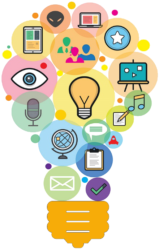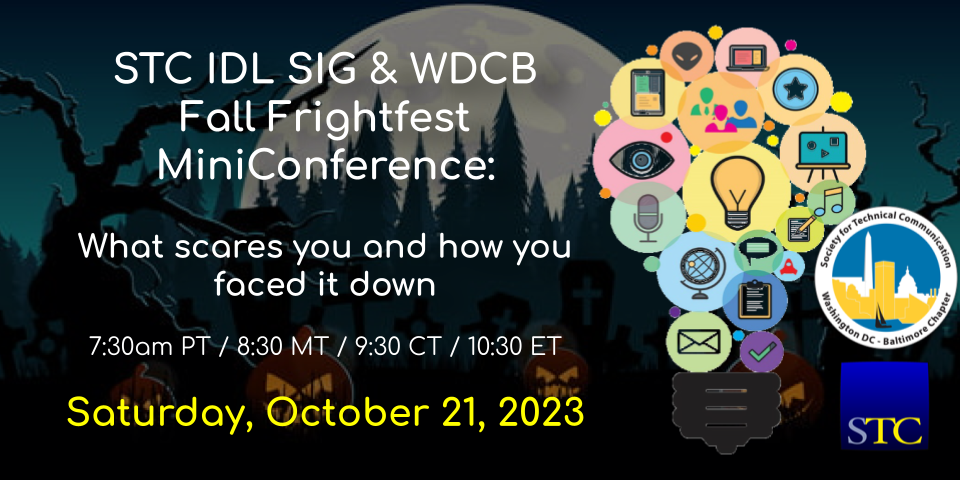STC IDL SIG & WDCB Fall Frightfest MiniConference: What scares you and how you faced it down
Register on Eventbrite, if you dare!
Come and talk about what scares you and how you faced it down.
When? October 21, 2023
- 10:30 am – 16:00 ET
- 09:30 am – 15:00 CT
- 08:30 am – 14:00 MT
- 07:30 am – 13:00 PT
Where? Zoom (of course)
Registration prices:
- Free to Students, academics, retirees, volunteers and presenters (to volunteer, email programs@stcidlsig.org)
- STC IDL SIG Members $5.00
- STC Members $20.00
- NonMembers $40.00
The all-day virtual MiniConference provides a variety of educational sessions related to technical communication, instructional design, and learning.
We are excited to announce that our keynote speaker will be Phylise Banner, a recognized superhero and pioneer in the LX design space. Read more about Banner on her website and share in our excitement.
Our day will be both educational and fun. Grab your Zoom-friendly Halloween costume, play a few warmup games, and maybe even win a prize. See the schedule and read more about the presentations and presenters below.
Schedule of Eerie educational sessions with nightmarish networking breaks
All times Eastern
- 10:30 am – Grisly games and intimidating intros with Villainous Viqui Dill
- 11:00 am – Killer Keynote with Phrightful Phylise Banner
- 11:45 am – “Caldron Bubble: Incorporating Cookbook Design Elements into Technical Documentation” with Jittery Jamye Sagan
- 12:30 pm – Buzzworthy BioBreak #1
- 12:45 pm – “Somebody’s Watching Me: Make Presenting on Zoom Not-So-Scary” with Rogue Rachel Eichen
- 1:30 pm – “Are your presentations frightfully ineffective? Let’s do better.” with Terrifying Traci Nathans-Kelly, Ph.D
- 2:15 pm – Bewildering Break #2
- 2:30 pm – “We Need New Blood: Creating Video Content” with Murderous Maralee Sautter
- 3:15 pm – “Supercharge your Documentation through Storytelling Superpowers” with Alex Hale
- 4:00 pm – Beastly BioBreak #3 to get in costume
- 4:20 pm – Wicked Wrapup and Chilling costume prizes: Villainous Viqui Dill
- 5:00 pm – Go home happy!
Presentations and presenters
Killer Keynote with Phrightful Phylise Banner
We are excited to announce that our keynote speaker will be Phylise Banner, a recognized superhero and pioneer in the LX design space. Read more about Banner on her website and share in our excitement.
Caldron Bubble: Incorporating Cookbook Design Elements into Technical Documentation with Jittery Jamye Sagan
Cookbooks not only contain a treasure trove of not only delicious recipes and anecdotes, but also serve as prime examples of solid technical communication. After all, recipes use words and images to help explain how to prepare a specific dish.
In this presentation, we will examine several examples of effective recipe design elements from various cookbook recipes. These examples will focus on the following elements of cookbook recipes:
- Overall layout, including columns and use of space
- Images, including photographs and drawings
- Text, including font styles and the wording itself.
As we examine each design element, we will also learn how they help make instructions – the recipe –easy to understand. We will then show how to apply them in our own technical communication deliverables, including job aids and quick reference guides.
Thus, cleanly-formatted and well-worded recipes from cookbooks can serve as the recipe for success in creating clear and concise technical communication.
About the Speaker
As the Pharmacy Communication Advisor for H-E-B, Jamye helps design training programs and materials for various projects and initiatives within the pharmacy department. She also manages communications between the corporate office and the store pharmacies.
An Associate Fellow of STC, Jamye serves as the current President of the South Central Texas chapter. She also volunteers with the Instructional Design and Learning SIG as its Treasurer and Survey Manager and belongs to various SIGs. Jamye has also volunteered at the Society level in various roles, including the Community Affairs Committee, the Community Achievement Award and Pacesetter Award committees, and the Associate Fellow committee. Over the past several years, she has reviewed several publications for the Technical Communication journal.
When not making “sense out of the seemingly senseless” in the tech comm world, Jamye enjoys transforming yarn into pretty and useful objects. She lives in San Antonio, TX.
Somebody’s Watching Me: Make Presenting on Zoom Not-So-Scary with Rogue Rachel Eichen
Rachel Eichen has a varied career history across multiple fields of communication, technology, and training. She has over 10 years of in-person and remote teaching experience in a variety of industries including: casinos, financial institutions, restaurants, hospitals, libraries. She even taught computer classes on a cruise ship! She has experience training all sorts of software applications including Microsoft Office and Adobe Photoshop, and web applications such as Google Apps and Facebook. In a former life, she was a technical writer where she learned about the software lifecycle and documented instructions. She also has a variety of technical skills, including a mix of programming, networking, and web-design. Rachel holds a Master’s degree in Library & Information Science and a bachelor’s degree in Technical Writing.
Are your presentations frightfully ineffective? Let’s do better with Terrifying Traci Nathans-Kelly, Ph.D.
Currently serving as the Robert N. Noyce Director of the Engineering Communication Program in the College of Engineering, Cornell University. Nathans-Kelly has a special interest in social justice and techquity issues, along with online teaching modalities. She interacts daily to help engineers and pre-professional engineers to hone their technical messaging, whether it be via presentations, on paper, in meetings and teams, or online channels. Read more and connect with her on LinkedIn.
We need new blood: Creating video content with Murderous Maralee Sautter
IDL’s own co-manager will talk us through her latest challenge: making a recruiting video for volunteers. Sautter has been a technical writer and instructional designer in the industries of high-tech/software, health, science, transportation, education, and government (Intel, Xerox, Thermo Fisher Scientific, Cambia, Regency/Blue Cross, City of Vancouver (WA), and more). Her favorite title is educator since she was an adjunct instructor at Portland State University for over 12 years. Currently, she is the manager of the Instructional Design & Learning SIG. Connect with her on LinkedIn.
Supercharge your Documentation through Storytelling Superpowers with Alarming Alex Hales
Alex Michael Hales will take us on a wild ride, using Marvel and DC characters (and their powers) as metaphors for different writing techniques and tools practitioners can use day to day. Hales is a Technical Writer based in Mesa, Arizona. He loves researching, brainstorming, conceptualizing, and drafting content.
Find out more and connect with Hales on his website.
Horrifying Hosting by Villainous Viqui Dill
Viqui Dill is an STC Associate Fellow who loves connecting people to communities and giving everyone a voice. Dill loves a good story. She can’t remember a time when she did not want to grab a guitar and start a sing along. As worship arts pastor for the exchange church in Winchester, VA, she gets to live the dream every other week. The Dills have a family band, the Dill Pickers, and Dill sometimes plays in a mostly girl band of mammas, Hot Flash. She describes herself as “Technical writer, wife and mom, bass player, worship leader, I’m happiest when folks sing along with me.” Connect on LinkedIn or just google her unusually spelled name to connect.

